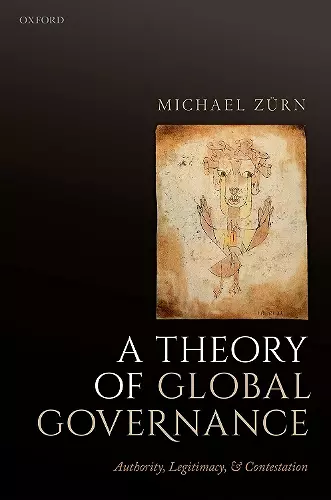A Theory of Global Governance
Authority, Legitimacy, and Contestation
Format:Hardback
Publisher:Oxford University Press
Published:8th Mar '18
Currently unavailable, and unfortunately no date known when it will be back
This hardback is available in another edition too:
- Paperback£31.99(9780198819981)

This book offers a major new theory of global governance, explaining both its rise and what many see as its current crisis. The author suggests that world politics is now embedded in a normative and institutional structure dominated by hierarchies and power inequalities and therefore inherently creates contestation, resistance, and distributional struggles. Within an ambitious and systematic new conceptual framework, the theory makes four key contributions. Firstly, it reconstructs global governance as a political system which builds on normative principles and reflexive authorities. Second, it identifies the central legitimation problems of the global governance system with a constitutionalist setting in mind. Third, it explains the rise of state and societal contestation by identifying key endogenous dynamics and probing the causal mechanisms that produced them. Finally, it identifies the conditions under which struggles in the global governance system lead to decline or deepening. Rich with propositions, insights, and evidence, the book promises to be the most important and comprehensive theoretical argument about world politics of the 21st century.
In this impressive work, Michael Zürn offers a sophisticated but accessible guide for readers trying to grasp the evolution of global governance in the conflict ridden world of today. * Jan Zielonka, Society *
In this impressive work, Michael Zürn offers a sophisticated but accessible guide for readers trying to grasp the evolution of global governance in the conflict-ridden world of today. * Jan Zielonka, University of Oxford, Oxford, UK, Society *
In this impressive work, Michael Zürn offers a sophisticated but accessible guide for readers trying to grasp the evolution of global governance in the conflict-ridden world of today. * Jan Zielonka, University of Oxford, Society *
This volume is an impressive synthetic text, pulling together the work of a couple of decades to sort out what is going on under the rubric of 'global governance'. Its sources cover the gamut of international relations thinking about institutions, international organizations, states, and how they have all worked to change governance over the last few decades. The story is far from simple, and much of this book is an attempt to parse out some clear findings from the confusion of empirical studies and theoretical approaches that dominate the vast literature on international governance, international regimes, law, and organization ... Michael Zürn's attempt to unravel how the politics of global governance has evolved so far is a very useful starting point to engage these debates. * Simon Dalby, Prometheus *
It is therefore not difficult to imagine how Zürn's approach will inspire further studies that support or challenge TGG's model of global governance by offering more fine-grained empirical assessments of global institutions. * Hannes Hansen-Magnusson, Cardiff University, International Studies Review *
With a new systematic conceptual framework, this book goes beyond its predecessors by developing a general theory-which at times risks overgeneralization-on the evolution of the global governance system. Rich with insights, it is an important theoretical exploration about world politics in the 21st century. * ZhengChen, China International Strategy Review *
ISBN: 9780198819974
Dimensions: 241mm x 163mm x 28mm
Weight: 630g
332 pages